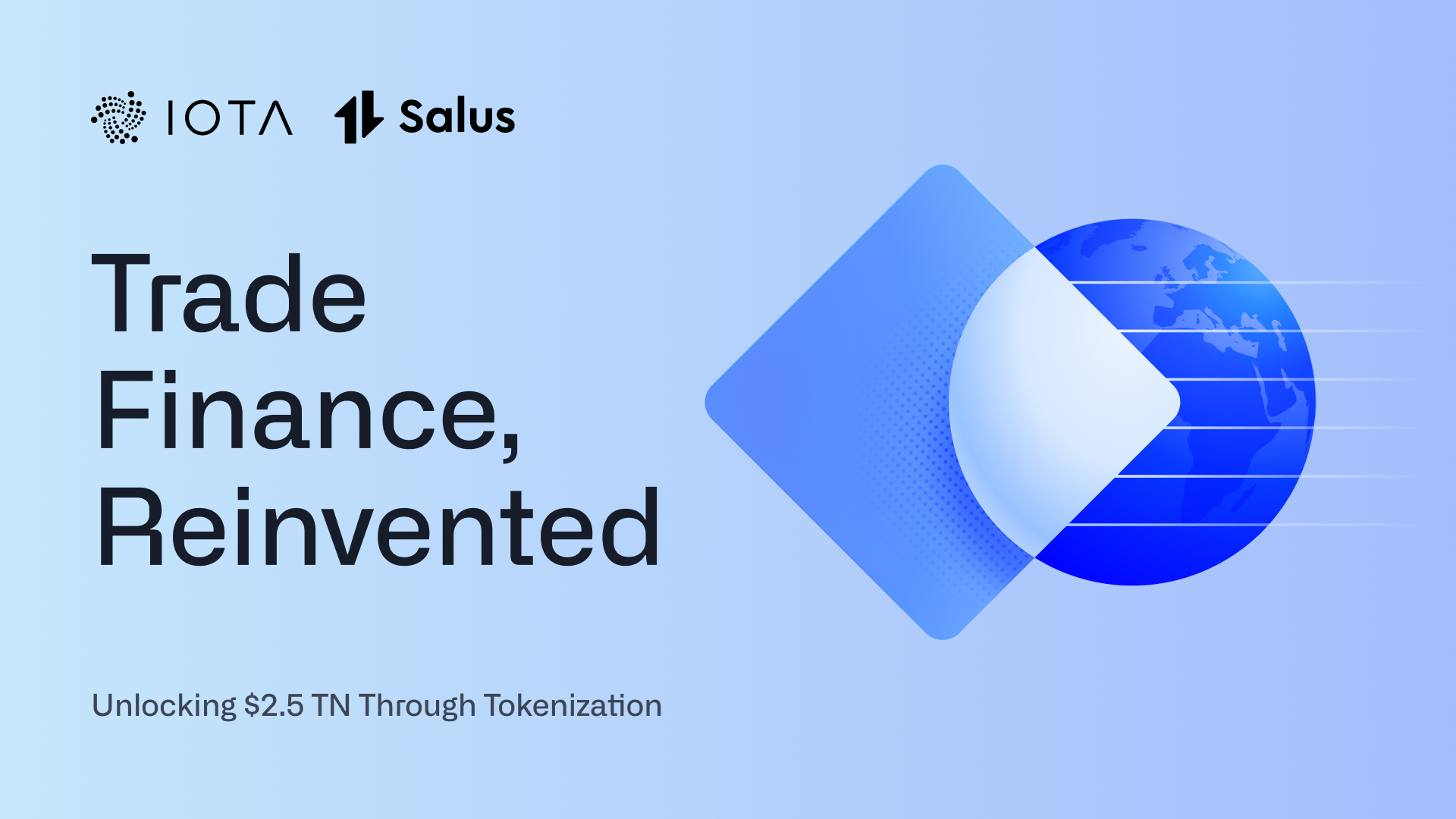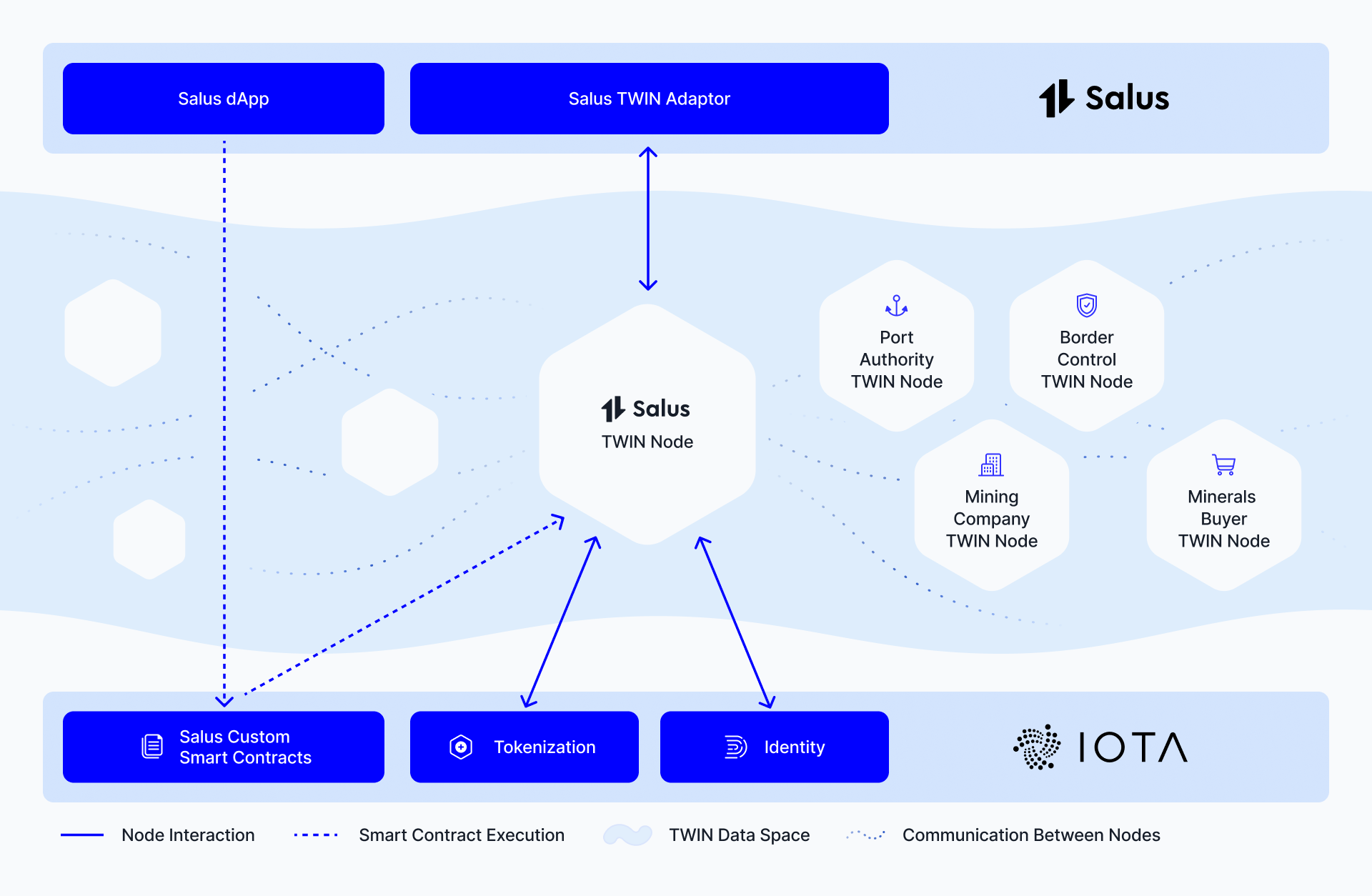Trade Finance, Reinvented
0
0
Unlocking $2.5T Through Tokenization

TL;DR:
By building the infrastructure for digitized trade and finance, IOTA is addressing the multi-trillion dollar global trade finance gap. Our partnership with Salus brings transparency to critical mineral supply chains. Alongside TLIP’s work in East African trade and Realize’s focus on tokenization, these initiatives show how IOTA enables trusted, real-time exchange of data and value, replacing fragmented, paper-based systems with secure digital infrastructure.
Global trade and industrial processes still run on outdated systems: paperwork, siloed databases, slow verification, and expensive intermediaries. These inefficiencies create risk, block innovation, and exclude smaller players, contributing to the global trade finance gap, last estimated at over $2.5 trillion – the shortfall between businesses’ need for funding to move goods across borders and the financing banks actually provide.
IOTA is building something different: open-source, digital public infrastructure that replaces outmoded workflows with real-time, immutable data. From supply chain traceability to cross-border coordination and trade finance, IOTA enables applications built to match how global industry actually operates.
The latest example is Salus, a platform that uses IOTA and TWIN, IOTA’s trade data infrastructure, to revolutionize trade finance in the critical minerals industry.
Salus: Transparent Finance for Critical Minerals
Demand for critical minerals like copper, lithium, and rare earth elements is soaring – driven by AI and the green energy transition. But financing the trade of these minerals is stuck in the slow lane. Payments are slow to process, trust is scarce, and paperwork piles up. Big banks are backing away, while smaller, more agile funders can’t yet trust the process.
Salus aims to cut through the mess with real-time tracking to verify shipments, turning fragmented, physical data into clear, auditable digital assets that funders can trust. By opening access to fresh capital, from DeFi funds to stablecoin pools, Salus brings transparency, speed, and liquidity to a critical industry held back for too long.
Founded to bring a proven trade finance methodology on-chain from day one, Salus is built natively for Web3, leveraging Web3 as a native solution, thanks to its integration with IOTA and the TWIN platform – particularly the three pillars of TWIN’s tech stack: identity, tokenization, and data sovereignty. This shift establishes a more trustworthy system for moving critical minerals across fragmented markets and jurisdictions and automating trade finance operations.
Here’s how IOTA and TWIN are helping Salus achieve that.
Digital Identity and Credentials
In global trade finance, knowing your counterparties is essential. Salus works with suppliers, buyers, inspectors, and investors who often operate in different legal jurisdictions. Compliance with KYC and AML regulations is non-negotiable.

Through TWIN, Salus uses IOTA Identity to manage the digital identities of not just the players involved in the critical minerals supply chain, but of entities like containers, transporters, and more. Features like decentralized identifiers (DIDs) and verifiable credentials allow every party in the system to be uniquely identified, without relying on a central authority. TWIN enables Salus to register these identities and credentials on the IOTA ledger, giving all participants a consistent, tamper-proof identity layer that works globally.
Tokenizing Trade Documents
It’s not only identity credentials that are registered on chain: key trade documents like warehouse receipts and bills of lading that represent ownership and provenance of critical minerals are tokenized, issued as NFTs, and anchored on the IOTA ledger.
Beyond representing ownership, these NFTs and their data points can be transferred across a network of TWIN nodes, making them part of a shared, permissioned data space. Whether the node belongs to a customs official, insurer, freight forwarder, or mine, each participant can access verified documents directly and securely at any point along its journey through the supply chain. This aligns with international digital trade standards like MLETR (Model Law on Electronic Transferable Records) and lays the groundwork for seamless, multi-jurisdictional document flows.
Tokenization also opens the door for decentralized applications to handle payments on-chain via smart contracts and stablecoins. This enables frictionless processing of payments without intermediaries, across multiple jurisdictions, and reduces delays and costs.
Audit Trails and Event Linking
Salus operates in environments where verifying real-world claims like the content, weight, or origin of a container is critical. These claims are used to secure financing, manage risk, and ensure ethical sourcing. It’s also vital to record key events along the supply chain – such as the arrival of minerals at a certified warehouse, their inspection, and their loading onto the next mode of transport.
TWIN provides the components to record this data and anchor it on IOTA’s mainnet. This creates a tamper-proof audit trail that links each item to its journey through the supply chain. Every inspection, movement, or update becomes part of a transparent, traceable record.
Smart Contracts for Documents and Assets
Salus will use IOTA Smart Contracts to automate core trade finance processes like transferring title, managing collateral, and executing payments, all based on real-world inputs.
For example, when minerals pass inspection, a smart contract could automatically trigger a partial payment to the supplier. Insurance confirmation, geolocation verification, or quality assurance could likewise trigger the next steps in the financing cycle.
Salus will customize its own application-specific smart contracts on the IOTA mainnet. These contracts will interact directly with the data recorded through TWIN, linking digital documents, inspection reports, and identity credentials into a coherent, automated transaction framework.
Removing Friction with the IOTA Gas Station
Finally, given the complexity of the critical minerals supply chain and the importance of onboarding smaller players unfamiliar with Web3, a smooth, hassle-free user experience is essential. To achieve this, each TWIN node integrates an IOTA Gas Station.
This allows the node operator (for example, Salus) to use IOTA tokens to cover transaction fees on behalf of its users (for example, investors). As a result, participants can issue IOTA Move smart contract transactions via the Salus dApp without needing to acquire or manage IOTA tokens themselves, lowering barriers to entry and ensuring a seamless experience.
Conclusion: Building Trust Into the Infrastructure
The interconnection between Salus, TWIN, and IOTA demonstrates how real-world trade challenges can be addressed with Web3 infrastructure. By bringing decentralized identity, tokenization, smart contracts, and transparent audit trails into the high-stakes world of critical minerals, Salus is building a new kind of digital trade finance ecosystem, aiming to revolutionize the $2.5 trillion trade finance gap through tokenization.
Salus is part of a broader movement within the IOTA ecosystem to modernize global trade with Web3 infrastructure. In East Africa, TLIP simplifies cross-border transactions by replacing PDF-based bureaucracy with real-time digital workflows. Realize is making assets like U.S. Treasury Bills accessible on-chain by directly tokenizing fund shares.
Each solution targets a different bottleneck. Together, they reflect a consistent strategy: rebuild the infrastructure of global trade so it runs on verifiability, automation, and inclusion.
Read the official press release about Salus here.
Learn more about IOTA's real-world applications and explore our developer resources at iota.org. To explore partnerships and integrations, contact our Product Adoption team at partnerships@iota.org.
0
0
 Manage all your crypto, NFT and DeFi from one place
Manage all your crypto, NFT and DeFi from one placeSecurely connect the portfolio you’re using to start.



